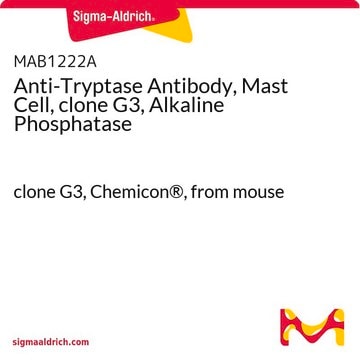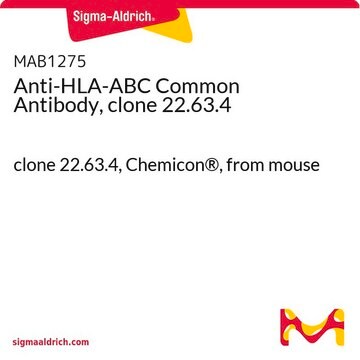MAB1222
Anti-Tryptase Antibody, Mast Cell, clone G3
clone G3, Chemicon®, from mouse
Sinônimo(s):
Mast cell tryptase antibody
About This Item
Produtos recomendados
fonte biológica
mouse
Nível de qualidade
forma do anticorpo
purified immunoglobulin
clone
G3, monoclonal
reatividade de espécies
human
fabricante/nome comercial
Chemicon®
técnica(s)
flow cytometry: suitable
immunohistochemistry: suitable
western blot: suitable
Isotipo
IgG1κ
nº de adesão NCBI
nº de adesão UniProt
Condições de expedição
wet ice
modificação pós-traducional do alvo
unmodified
Descrição geral
Especificidade
Aplicação
Optimal working dilutions must be determined by end user.
Inflammation & Immunology
Inflammation & Autoimmune Mechanisms
Qualidade
Western Blot Analysis: 0.5 µg/mL of this antibody detected tryptase in 10 µg of human fetal skin lysate.
Descrição-alvo
forma física
(see product datasheet for specific buffer formulation)
Armazenamento e estabilidade
Nota de análise
Mast cells, basophils
Human fetal skin lysate
Outras notas
Informações legais
Exoneração de responsabilidade
Código de classe de armazenamento
12 - Non Combustible Liquids
Classe de risco de água (WGK)
WGK 1
Ponto de fulgor (°F)
Not applicable
Ponto de fulgor (°C)
Not applicable
Certificados de análise (COA)
Busque Certificados de análise (COA) digitando o Número do Lote do produto. Os números de lote e remessa podem ser encontrados no rótulo de um produto após a palavra “Lot” ou “Batch”.
Já possui este produto?
Encontre a documentação dos produtos que você adquiriu recentemente na biblioteca de documentos.
Active Filters
Nossa equipe de cientistas tem experiência em todas as áreas de pesquisa, incluindo Life Sciences, ciência de materiais, síntese química, cromatografia, química analítica e muitas outras.
Entre em contato com a assistência técnica








